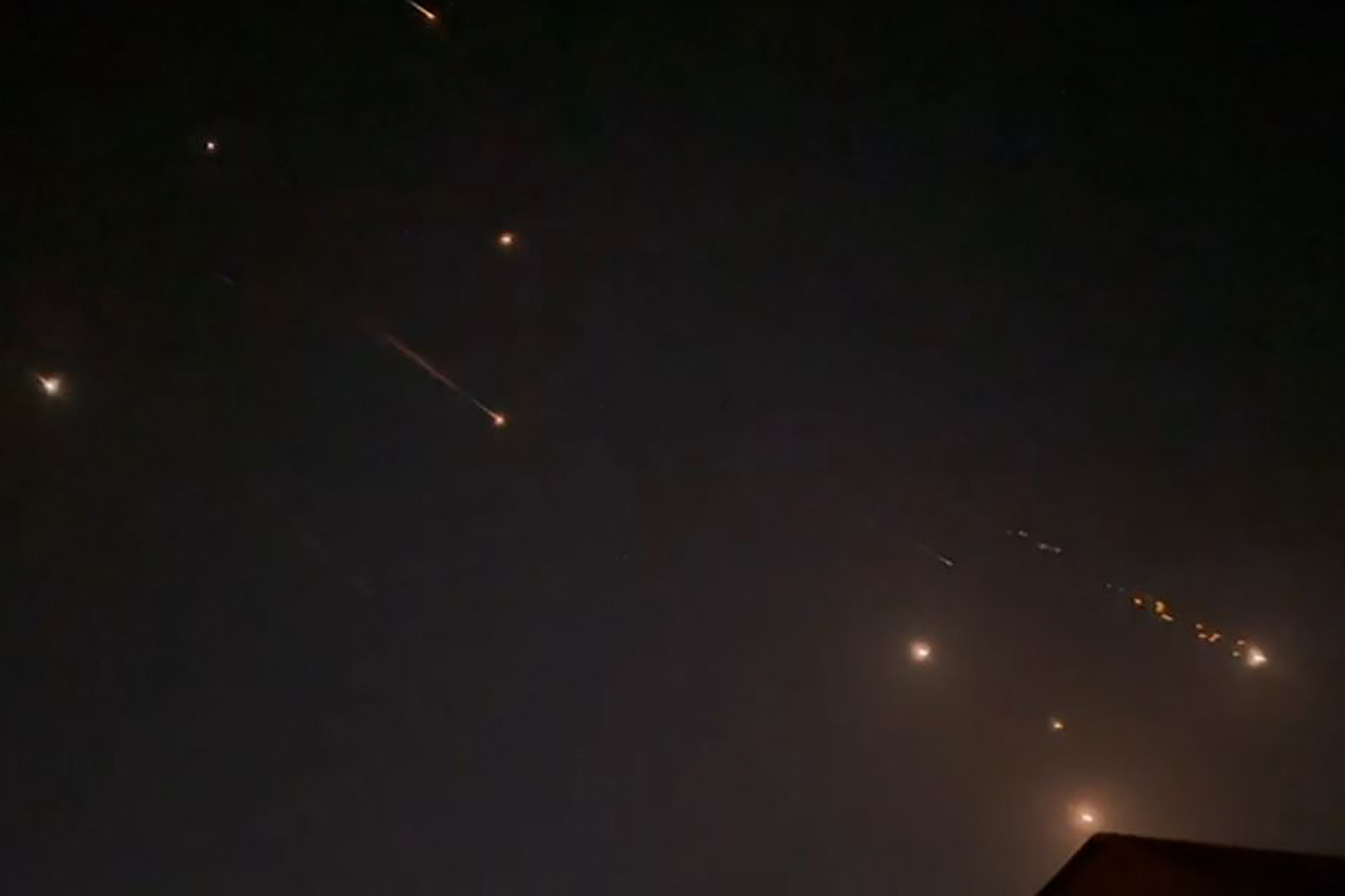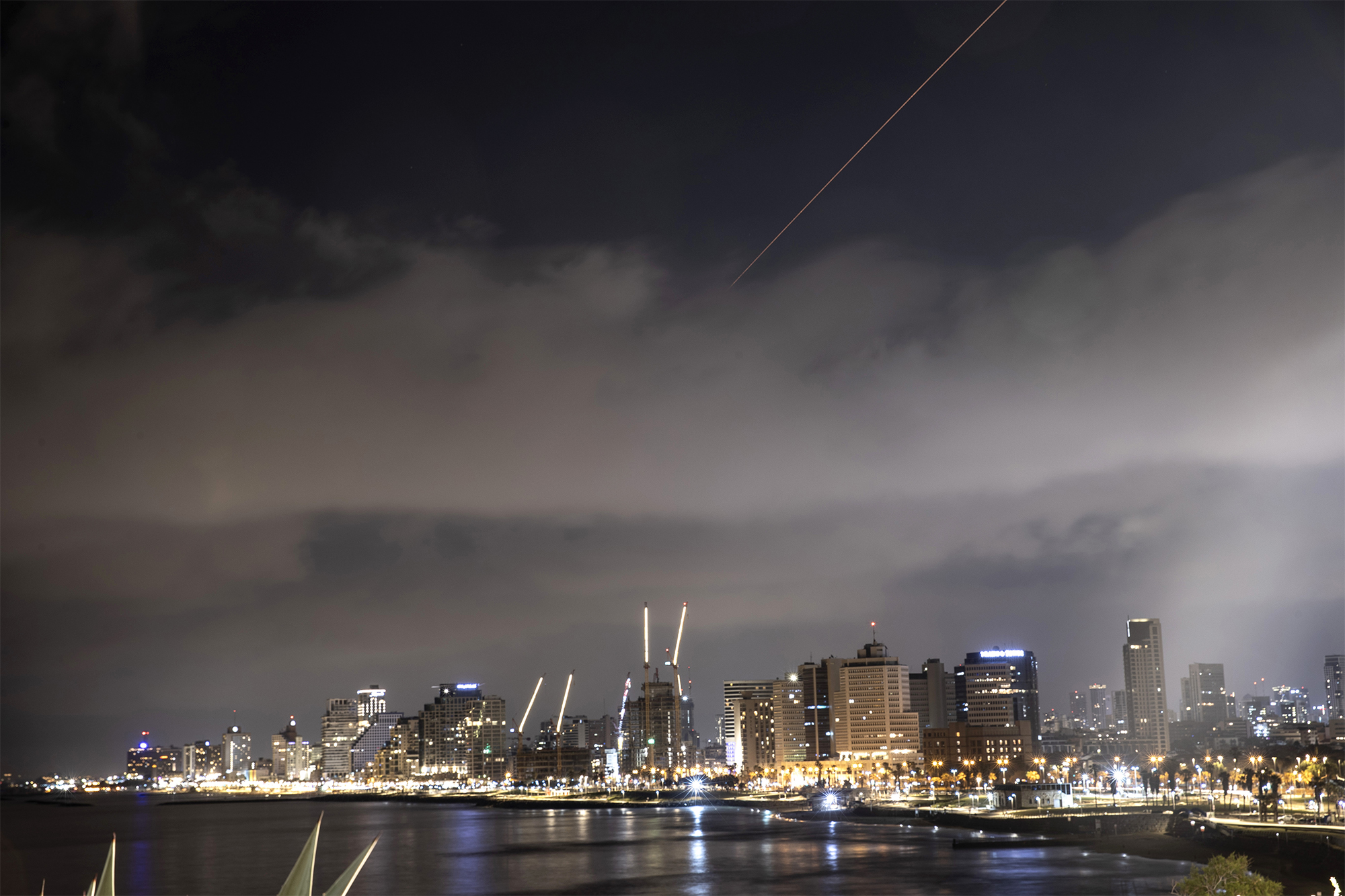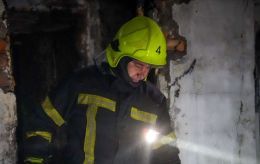Russia is interested in major war in Middle East - Former Israeli Ambassador to Russia
 Former Israeli Ambassador to Russia Arkady Mil-Man (photo: inss.org.il)
Former Israeli Ambassador to Russia Arkady Mil-Man (photo: inss.org.il)
The Israeli strike in response to Iran, risks of full-scale war, Israeli attitudes toward Russia, Western and Arab world positions - these issues were discussed with the Israeli diplomat and former Ambassador of Israel to Russia, Arkady Mil-Man, in an interview with RBC-Ukraine.
The massive missile and drone attack by Iran on Israel on the night of April 13-14 instantly became the top priority of the international agenda. With support from a number of Western and Arab countries, Israel's air defense successfully handled the attack with minimal damage.
Now, in the Middle East and beyond, all eyes are on Israel's response. The country's leadership has assured that a response will come, but its format and timing remain secret.
"The retaliation will come at a moment when Iran least expects it," says Arkady Mil-Man, Israeli diplomat, who served as Ambassador to Moscow from 2003 to 2006 and previously led Israeli diplomatic missions in Azerbaijan and Kazakhstan. Mil-Man currently heads the Russia Studies Program at the Israeli Institute for National Security Studies.
Diplomat told RBC-Ukraine that following the Hamas terrorist attack on Israel last October and after Russian authorities and propagandists clearly outlined their position in that story, Russia has become a close ally of Iran, making it clear to the Israeli population that Russia is not a friendly country for them. However, Israel's political and military establishment is only just realizing this.
- Should we expect an Israeli strike in response to the recent Iranian attack, and in what form might this strike be?
- There will definitely be a reaction to the attack from Israel. It was an unprecedented attack. For the first time, Iran launched a huge number of rockets and drones. There were 185 drones of various modifications, 110 ballistic missiles, and the rest were cruise missiles. Nine of them managed to reach Israeli territory. So we are talking about a very small percentage that actually crossed the border, but they were all shot down.
Minimal damage was inflicted. There is a crater near the runway at one of Israel's military bases in the Negev, in the south of the country. An eight-year-old Arab Bedouin girl was injured. She underwent surgery and remains in critical condition.
These are all the damages inflicted by Iran. Everything was shot down at various levels, using the most advanced Israeli developments such as Arrow-2, Arrow-3, Iron Dome, other Israeli missiles, and developments. Israeli planes were in the air, as were planes from the US, UK, and Jordan. Jordanian pilots did their job very professionally. French pilots were also involved, as were certain US missile defense systems.
Several other Arab countries in the region were probably involved in terms of monitoring, reconnaissance, and so on. So, the coalition coped with Iran's threats.
Iran may talk about achieving great success, that's what their propaganda says today. It was an unprecedented attack, and its magnitude and quantity was unbelievable. It came through Iraq and Jordan, through Syria, something was even coming through the Arabian Peninsula I think. The Iranians tried, but they didn't reach the results they were aiming for.
- But Israel will respond anyway?
- The response will come anyway, in any case, even if the attack was unsuccessful. There will be a response from us. Such things must be punished, and Iran understands perfectly well that Israel will respond.
Right now, everyone is worried, but let them feel on edge and nervous for a while. We will decide when to do it, but there will be a response, definitely, because such things cannot go unnoticed. But it's up to the Israeli government and military establishment regarding when and how to respond.

Explosions in the sky over Israel on the night of April 13-14 (photo: Getty Images)
- What are the options, theoretically?
- Theoretically and practically, the following options could be considered. It's possible to target certain objects, critical infrastructure. We are by no means talking about causing damage to civilian objects. We're not talking about harming civilian populations. It's about targeting military and nuclear infrastructure in Iran. Because the moment Iran possesses nuclear weapons, not only Israel will be under threat, Europe will be under threat, Ukraine will be under threat, the United States of America as well, everyone will be under threat because if this regime acquires such dreadful weapons it will be a serious concern for all.
Next, there could be various actions against Iranian forces in Syria, in Iraq, and so on. There could be responses within Iran itself, diplomatic methods, additional sanctions, increasing pressure on Iran, cutting off any economic ties, and so forth.
There could be a whole range of different means that could be utilized, but acting impulsively - never. There's an old Bedouin saying that retribution must be cold and may take 40 years. I don't think it will take 40 years for this. Retribution will come at a moment when Iran will least expect it. I am sure it will be a big surprise for them. It just needs to be prepared properly to avoid escalation, for Iran to clearly understand that it cannot engage with free countries of the world, countries that seek some form of peaceful coexistence.
However, Iran's actions are aimed at sowing chaos. Iran is acting pretty much like Russia. By the way, Putin called Raisi (Iranian President Ibrahim Raisi). He probably wished him luck... And Russian propagandists on Solovyov's channel, who should have been put in jail along with his propagandists long ago, are stating that American and Israeli planes should be shot down, and in general, Iran is great, they are our allies, Israel and America should be bombed, everyone should be bombed.
What do we have here? Saudi Arabia's position is very important for Russia because the price of oil depends on them. Russia needs it to rise, to find money, to buy weapons, to continue the war in Ukraine. And Saudi Arabia has cooperated with us against Iran, so from this perspective, Russia also has some issues.
- Not only propagandists, but let's say, Russia's deputy head at the UN, Polyanskiy, wrote on his Telegram channel about the 'Franco-Saxon-Netanyahu gang.' After Hamas' attack on Israel last October, when Russia made it quite clear who it sided with, when after delegations of terrorists flew to Moscow and met with Russian officials, when there were outbreaks of anti-Semitism in Russia - over the past six months, has all this affected Russia's relations with ordinary citizens and the political leadership of the country, deputies, those who make decisions?
- Indeed, on October 7, Russia unequivocally took an anti-Israel, pro-Hamas position. One hundred percent. It became clear to the entire population, all civilians, everyone began to understand that Russia is an absolutely unfriendly country.
But as for the political establishment, the military establishment... Because of the presence of the Russian military in Syria, they get it, but not entirely.
- So the Syrian factor - the fact that there is Syria, there are Russians in Syria, it's a question of our security, let's not sever all ties with Russians - does it still work?
- Yes, you're right, but ultimately, this will still lead to a confrontation with Russia because Russia is increasingly involving itself in Iranian affairs, there's increasing cooperation on a strategic level, especially military.
In the end, there will be a complete merger, and at some point, we will have to strike at that too. That's where it is all going. So we need to be prepared for various scenarios, and if Russia crosses certain red lines, we'll have to act, there's no way out.
The situation is very complex, and we understand that, we don't want to escalate it, but the fact that Russian propagandists sit and talk about how good it is that Iran is attacking Israel, and the fact that they are allowed to say such things... Well, someday the Russians will cross these lines. And they'll give Iranians the opportunity to supply weapons to Hezbollah, which will ultimately be aimed at Israel.
And this thread, this axis of evil - Russia, Iran, North Korea, Hezbollah, Hamas, Islamic Jihad, Houthis, and other terrorist organizations - all of this ultimately could lead to a confrontation. So we need to be prepared for that too. But unfortunately, instead of everyone in our establishment understanding as quickly as possible what's going on, the process is moving sluggishly and very slowly.
- If a harsh response is potentially chosen, for example, a strike on Iranian positions, could this exchange of attacks between Iran and Israel turn into a full-scale war involving many countries in the region?
- All of this could escalate into a large regional war, if not bigger than that. And, by the way, Russia is very interested in this. These strikes by Iran on Israel were beneficial for them now because everyone forgot there was a war in Ukraine. Forgot again.
On the other hand, the Speaker of the US House of Representatives, Johnson, talks about the fact that assistance to Ukraine, Israel, and so on will indeed be put to a vote. However, some Republicans resist. I watched some interviews given yesterday evening on various American channels by some Republican senators. And honestly, it's very disappointing to me because these people don't seem to want to look two steps ahead. They want to stay where they are now. They don't want to think about what will happen if, God forbid, Russia wins in Ukraine. What will happen? There will be a world war, a war with Europe, and ultimately, America will have to fight too.
And these people have some kind of escapism, they seem to be running away somewhere and don't want to hear that there's a problem. It's like ostrich behavior: burying their heads in the sand, seeing nothing, hearing nothing.
And it's disappointing. Because we want this, whether we like it or not, America is our ally, it is Ukraine's ally, Israel's ally. It will be difficult for both Ukraine and Israel to cope without this country. It's much harder for Ukraine than for us. Because the scales of conflicts are different. The enemy is much stronger. And I don't understand how this is not obvious. But these are internal political struggles, and it's very disappointing.
- How do you assess the behavior of the authorities of the United States, as well as Great Britain and other Western allies in recent days? On one hand, they helped you repel this Iranian attack. On the other hand, after it was over, all official figures were signaling to you by all possible means, pleading not to strike back, that if you dare to do so, they will no longer help you.
- This behavior is rational and logical given the situation in these countries. Iran attacked Israel, they did not attack America, they did not attack Britain, they did not attack France. It's far from them, right? They helped us and protected us. Participating now and bombing Iran is not in their interest because it's clear that it would escalate, it would go far beyond the limits.
They helped us prevent an attack. But that doesn't mean they should attack with us if we want to strike back. That's an attack on Iran, and defensive means and offensive means - these are different categories. So everything is quite logical.
But in such situations, rational people must have a response. Because if you're hit, especially in the Middle East, where military power plays a big role, and you don't respond, then you're weak, then you can be hit again next time. But the response must be thoughtful and well-prepared.
We shouldn't underestimate Iran's strength and capabilities. The fact that they couldn't cause us much harm is our merit. But that doesn't mean their sky is full of holes, that doesn't mean they can't launch another thousand rockets at us. This is a country with a huge military potential. They produce medium-range missiles and ballistic missiles. These are not Russian-made, not North Korean, these are their missiles, their drones. And these drones caused great damage to the Ukrainian army too, and continue to do so every day.
So we really need to understand that the response must be very well prepared. It must be a complex of measures. But this complex must involve an international coalition. Why? Because everyone must understand that Iran, like Russia, like North Korea, and other terrorist organizations bring evil to the free, normal world, to normal people who want to live normally. This is the axis of evil, and the axis of evil requires a coalition approach, where everyone gathers, makes decisions, and each acts in their own direction to prevent these countries from spoiling our normal human life.
If this doesn't reach the minds of the European community, if the politicians there don't understand that Ukraine is now fighting the most terrible war, which protects their lives, they're just next in line. And if someone there doesn't understand this, then they are making a serious mistake.

Explosions in the sky over Israel on the night of April 13-14 (photo: Getty Images)
- How have the events of the past few days been generally perceived in the Arab world, particularly in Saudi Arabia, the United Arab Emirates, Qatar, and other influential states in the region?
- Qatar has special ties with Iran, Hamas, and others because Qatar supports the ideology of the Muslim Brotherhood, an ideology opposed by Egypt, Saudi Arabia, and so forth.
Let's not forget how Iranians attacked AramCo (Saudi Arabia's national oil company - ed.) on Saudi Arabian territory a few years ago, also with missiles. And fundamentally, for Saudi Arabia, for the Emirates, for Bahrain, Iran poses a serious threat. So the fact that these countries partially participated to some extent in repelling the attack, cooperating with the Americans, indicates that there is clearly a sense of satisfaction there today that Iran failed to inflict any damage. Why? Because if it weren't for this coalition and they really did cause us great harm, Iranians would see encouragement to go further and attack Saudi Arabia and the Emirates.
Iranians are trying to antagonize and pressure Saudi Arabia. Despite the fact that they have restored relations, there are many problems there, they are not friendly countries. So in these countries, and in Egypt too, there is a certain degree of satisfaction. They don't talk about it openly, but it's clear that the political and military establishments have also seen how strong and important the international coalition is to counter this axis of evil. And they understand very well that if there is a threat to them next time, then again this coalition, including Israel, will help them defend their skies and provide them with a certain or high level of security to preserve their independence.
This is also a message from Iran to the whole world that when such a coalition is formed and there is a common interest, one can successfully resist this evil.
- Events in the Gaza Strip have been sidelined amid the Iranian attack on Israel. How have the events of the past few days influenced and could influence the situation there? And after Israel withdrew a significant portion of its forces from the Gaza Strip, what can be expected there?
- Undoubtedly, in recent days, all attention has been focused on Iran and this attack. And the Gaza Strip remained somewhat on the sidelines, with localized skirmishes. Unfortunately, Hamas again rejected our proposals for the release of hostages. It only intensified its demands, which will also require serious decisions on our part. Right now, it's a transitional period there, and we need to think further about what to do.
There are still about four Hamas battalions in Rafah. And it needs to be understood whether there will be any further military action to clear them in this area. Let's see how events unfold, but the situation is complex, very complex.

